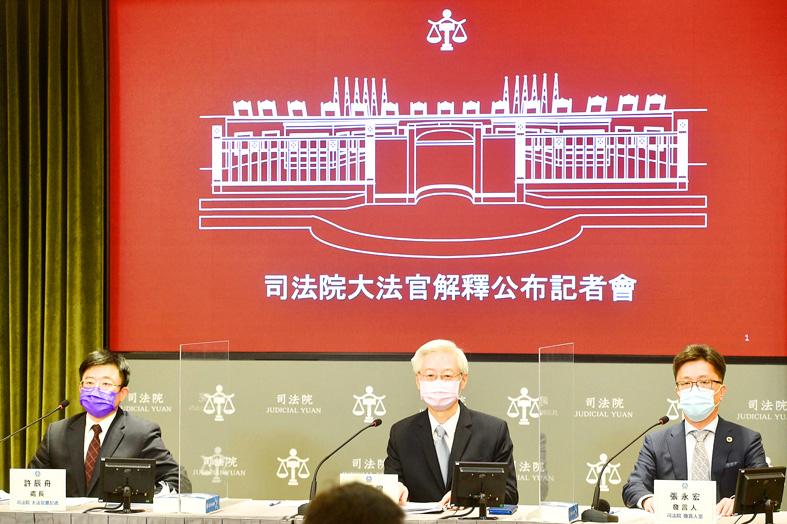The Council of Grand Justices on Friday ruled that forced labor as a punishment for criminal offenses is unconstitutional and would no longer be allowed.
Four lower-court judges and 32 citizens challenged the compulsory labor provisions of the Criminal Code and the Organized Crime Prevention Act (組織犯罪防制條例), which allowed “habitual offenders” who have been found guilty of theft, possession of stolen goods or certain organized crime activities to work under supervision at correctional facilities before or after serving a jail sentence.
The provisions are intended to provide assistance to offenders by teaching them work skills or a trade, which is intended to help with their rehabilitation and reintegration into society.

Photo: George Tsorng, Taipei Times
Under Article 90 of the Criminal Code, a “habitual criminal” or anyone who “commits an offense because of habits of loitering or vagrancy, before execution of punishment, shall be committed” to perform three years of compulsory labor, which can be extended by one-and-a-half years.
Article 3 of the Organized Crime Prevention Act states that a “person initiating, hosting, controlling or directing a criminal organization must be sentenced to imprisonment for not less than three years,” and “before the execution of the punishment, he or she shall be committed to a labor establishment to perform compulsory labor for a period of three years.” Similar provisions are in the Rehabilitative Measures for Burglar and Fence Criminals Act (竊盜犯贓物犯保安處分條例).
Chief Grand Justice and Judicial Yuan President Hsu Tzong-li (許宗力) said that offenders were being punished twice for the same crime, working under nearly the same conditions as prisoners, and after the three years of labor, “they go on to serve their sentences,” but “when they are released, their learned job skills could be already out of date.”
The ruling abolishes the compulsory labor, which is served at facilities run by the Ministry of Justice’s Agency of Corrections.
The council ruled that the provisions contravened the principle of proportionality and the personal freedom guaranteed under Article 8 of the Constitution.
Although it was a majority decision, Grand Justice Wu Chen-huan (吳陳鐶) filed a dissenting opinion, while three other grand justices expressed a “partial dissenting opinion” on some aspects of the ruling statement.
Additional reporting by CNA

ANOTHER EMERGES: The CWA yesterday said this year’s fourth storm of the typhoon season had formed in the South China Sea, but was not expected to affect Taiwan Tropical Storm Gaemi has intensified slightly as it heads toward Taiwan, where it is expected to affect the country in the coming days, the Central Weather Administration (CWA) said yesterday. As of 8am yesterday, the 120km-radius storm was 800km southeast of Oluanpi (鵝鑾鼻), Taiwan’s southernmost tip, moving at 9kph northwest, the agency said. A sea warning for Gaemi could be issued tonight at the earliest, it said, adding that the storm is projected to be closest to Taiwan on Wednesday or Thursday. Gaemi’s potential effect on Taiwan remains unclear, as that would depend on its direction, radius and intensity, forecasters said. Former Weather Forecast

As COVID-19 cases in Japan have been increasing for 10 consecutive weeks, people should get vaccinated before visiting the nation, the Centers for Disease Control (CDC) said. The centers reported 773 hospitalizations and 124 deaths related to COVID-19 in Taiwan last week. CDC Epidemic Intelligence Center Director Guo Hung-wei (郭宏偉) on Tuesday said the number of weekly COVID-19 cases reported in Japan has been increasing since mid-May and surpassed 55,000 cases from July 8 to July 14. The average number of COVID-19 patients at Japan’s healthcare facilities that week was also 1.39 times that of the week before and KP.3 is the dominant

The Chinese Communist Party’s (CCP) working group for Taiwan-related policies is likely to be upgraded to a committee-level body, a report commissioned by the Mainland Affairs Council (MAC) said. As Chinese President Xi Jinping (習近平) is increasingly likely to upgrade the CCP’s Central Leading Group for Taiwan Affairs, Taiwanese authorities should prepare by researching Xi and the CCP, the report said. At the third plenary session of the 20th Central Committee of the CCP, which ended on Thursday last week, the party set a target of 2029 for the completion of some tasks, meaning that Xi is likely preparing to

US-CHINA TRADE DISPUTE: Despite Beijing’s offer of preferential treatment, the lure of China has dimmed as Taiwanese and international investors move out Japan and the US have become the favored destinations for Taiwanese graduates as China’s attraction has waned over the years, the Ministry of Labor said. According to the ministry’s latest income and employment advisory published this month, 3,215 Taiwanese university graduates from the class of 2020 went to Japan, surpassing for the first time the 2,881 graduates who went to China. A total of 2,300 graduates from the class of 2021 went to the US, compared with the 2,262 who went to China, the document showed. The trend continued for the class of 2023, of whom 1,460 went to Japan, 1,334 went to